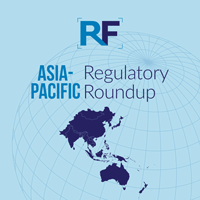Asia-Pacific Roundup: India seeks feedback on creating regulatory framework that supports innovation
 AsiaBiologics/ biosimilars/ vaccinesBiotechnologyMedical DevicesOceaniaPharmaceuticalsProduct LifecycleRegulatory Intelligence/Policy
AsiaBiologics/ biosimilars/ vaccinesBiotechnologyMedical DevicesOceaniaPharmaceuticalsProduct LifecycleRegulatory Intelligence/Policy AsiaBiologics/ biosimilars/ vaccinesBiotechnologyMedical DevicesOceaniaPharmaceuticalsProduct LifecycleRegulatory Intelligence/Policy
AsiaBiologics/ biosimilars/ vaccinesBiotechnologyMedical DevicesOceaniaPharmaceuticalsProduct LifecycleRegulatory Intelligence/Policy